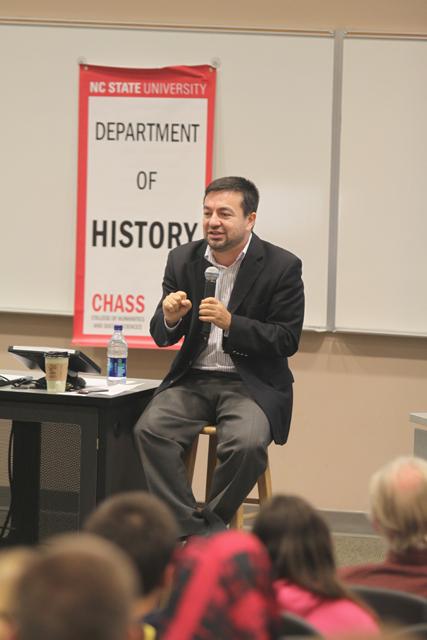
© 2010 Student Media
Abdullah Antepli, an imam or religious leader at Duke University, speaks to students during a lecture on Oct. 4.
The message, “Islam is evil, and Muslims are terrorists,” is one that Imam Abdullah Antepli is trying to combat every day, and he said he hopes students will join him in the fight.
Antepli, Duke University’s Muslim Chaplain, spoke to students on Monday night in Withers Hall about the realities of Islam and the world’s controversial perception of Muslims post-9/11, calling it “Islamaphobia.”
After providing a brief overview of the different perceptions of Islam, Antepli said Islam is not a monolithic institution to be fought as the United States fought the Soviet Union during the Cold War.
“Islam is not the ‘scary monster’ that the media likes to portray it as. This view is somewhat new, but it is fabricated.”
Citing media outlets including Fox News, Antepli said this is an inaccurate representation of Islam and has been circulated so much that, to many people, the truth no longer matters.
“There has been an extensive and sophisticated campaign to give Islam a negative image, and this quick association of Muslims with violence and terrorism is one of the biggest problems we are facing,” Antepli said.
“People view Islam as if our values are irreconcilable with Christian and Western beliefs,” said Antepli. “Muslims today are marginalized, and we feel like the unwanted members of the human family.”
Antepli’s talk stressed the separation of the violence of extremist terrorist organizations and the Islamic faith, though he acknowledged members of the public often come to the conclusion that they are one and the same.
“I’m not denying the existence of some evil people and their horrible actions in the name of Islam, but the number of these people is disproportionate with the global Muslim population,” said Antepli. “You have to put things in perspective.”
Antepli said Islamaphobia is not a new phenomenon, and this type of fear and hatred has been a recurring problem throughout history.
“This is nothing new—it’s a human weakness. Society is once again sick with fear. Islamaphobia is nothing but a manifestation of previous human failures and have been directed toward a collective group of people,” said Antepli. “Look at the social patterns of how we fought anti-Semitism, racism, homophobia, etc. It took millions of people to turn to ash in the 1940s as the whole world is watching before the masses fought against anti-Semitism.”
As an imam, an Islamic religious and community leader, Antepli counsels many Muslim students about the problems they face regarding the public’s view of their religion. However, Antepli’s collegiate advisees are not the only ones feeling the effects of this fear. Antepli said his nine-year-old daughter is bullied constantly as a result of the perception of their faith.
“My daughter would come home from school and ask me, ‘Are you sure it is okay to be Muslim? Are you sure there is nothing wrong with us?’ She is bullied at school all the time by teachers and students who say, ‘Your parents are terrorists. They blow up buildings.’ She’s perplexed by this, and it’s left a different kind of scar on her soul,” said Antepli. “How can you expect a nine year old to understand this? It is forcing her to grow up too quickly. It’s stealing her childhood and her innocence.”
Assir Abushouk, a sophomore in mathematics education and statistics, said he completely understands how Antepli’s daughter feels.
“In high school, when people asked me what my religion was and found out I’m a Muslim, it was like they’d stay far away from me and wouldn’t associate with me, even though they were fine with me before they knew,” said Abushouk. “But here at N.C. State, people who have talked to me about my religion have understood that there is diversity at the university level, and most people just want to know what Islam really is.”
Anna Bigelow, assistant professor of philosophy and religious studies, said she and her colleagues invited Imam Abdullah to speak about Islam following the rise in negative media attention toward Muslims.
“We invited him given the recent upsurge in the apparent fear of Islam with incidents like the ‘Qur’an Burning Day,’ said Bigelow. “Since he is one of the only Muslim Chaplains, we thought it would provide an opportunity for students that only a few other universities have to truly learn about the religion and how he handles the current situation.”
Bigelow said she wants students to primarily remember Antepli’s assertion that it is the public’s responsibility to find out the truth for themselves.
“People have to take responsibility for seeking out the truth, instigating their own search for knowledge, and getting to know their peers,” Bigelow said. ”They have to make the changes they want to see.”
Abushouk said if students want to know the truth, they should ask students that are Muslims.
“Go ask a Muslim. We are always welcoming to people and we are always open to questions. Go find out for yourself,” said Abushouk. “The media looks at Islam from the outside, but the way to really find out about Islam is to ask someone who is living it.”